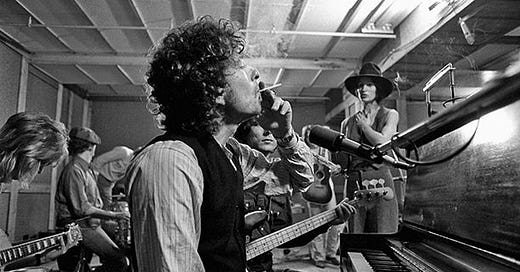I love Bob Dylan. I’ve seen him live about ten times, and even one show in 1991 when he was more than half drunk still ended up having revelations in it. The other times, he was good, great, spectacular, transcendent, timeless, you pick the adjective. Just to see him play has that peculiar ‘I’m in the presence of greatness’ thing. I can’t imagine what it’s like from his side, to hear the roar every time he steps on stage.
All his professional life, he’s been special. Crowds part, people gaze in reverence, become reduced to puddles of fandom, all of which Dylan complains about but does nothing to change. He’s inscrutable, aloof, silent, elsewhere in the room while people orbit around. He could take some pointers from McCartney on being a regular person, but he seems incapable of that. He’s 83, ain’t gonna change now. He’s sees visions, folks. Can’t turn it off. That’s just Bob, as Obama said.
Fine. But the mystique he’s conjured up over all this time, even though he rejects such categorization, is one of a person apart, a mystic, a savior, a visionary. And that makes certain fans and followers and dylanologists et al. a breed of fundamentalists. Not in the Christian or religious sense, but in the sense of absolute belief in the supremacy of Bob.
Saturday Night Live used to have the ‘Da Bears’ skit, where uber Chicago Bears fans ate pizza, drank beer, had periodic heart attacks and spent the night agreeing that the greatest team of all time was ‘Da Bears.’ This breed of Dylan fans I’m talking about are like this, sitting around saying, ‘Da Bob.’
Hyperbole abounds, Dylan has become “Our Shakespeare.” Good example, so let’s make a full stop here. Dylan’s lyrics are great, they probe the depths of human existence, they’re uplifting, bleak, funny, heartbreaking. Similar to what Shakespeare does. But the language of Shakespeare is at a level of complexity, beauty, metaphor on metaphor, brilliant in a such a way that no writer has come close to matching it, let alone Dylan. Dylan doesn’t enter the arena - he’s so far away from that level of mastery that comparisons are ridiculous. There shouldn’t ever have been a comparison in the first place. The two disciplines, songwriting and playwriting, are miles apart, and have little to no connective tissue. People looking for a new Shakespeare would be better off looking at movie writers, but even that would be fruitless. Shakespeare came from a unique time of literature and sensibility, when Queen Elizabeth, in her court, fostered the highest level of thinking, wit, and perfection in speaking the world has ever seen. Shakespeare - Edward DeVere - came out of Elizabeth’s court, was raised in it, learned to answer questions in rhymed couplets, shoot back brutally insulting barbs couched in polite language, offer praise in the loftiest of terms, watch the labyrinthine machinations of brutal power shifts at work. This was the living university for Shakespeare, where the language and characters of the plays were forged.
All of this has no relation to the life of Bob Dylan and how his words and work came to be.
I keep writing in these posts, ‘Comparisons are odious.’
Where I believe this Bobdolatry is most harmful is in the insistence that Dylan is on top of the heap. ‘Being on top’ in music is an outmoded conceit. Joni Mitchell kicked back at Dylan a while ago, out of frustration, I’m sure, at hearing this sort of ‘Da Bob’ talk. She played with Charles Mingus and Herbie Hancock, Jaco Pastorius and Pat Metheny, doing things Dylan could never do. The same with Randy Newman, as huge an American songwriting figure as there is. He’s drawn scathing portraits of history, created hysterically funny social commentary, written orchestral works, penned songs as dark as it gets, “Let’s Burn Down the Cornfield,” and as light, “You’ve Got a Friend in Me.” Paul Simon brought multi-culturalism to popular music, countless great songs, beautiful standards like “Bridge Over Troubled Water” and “Homeward Bound.” Leonard Cohen wrote songs of deep poetry and angst, clarity and piercing insight, poetry that rivals Dylan at every turn and in fact beats his, frequently. Dylan could never have written “Halleluiah.” And Cohen could never have written “Blind Willie McTell.”
As it is and as it should be.
What I’m saying here is, these, and many others, are our great songwriters. To put one over another denigrates the one under and falsely elevates the other. Each has a unique gift to offer.
Yes, Bob is great.
Get over it.
The garden is large, and in it, greatness abounds.





Reff - thanks for the thoughtful comments. You're probably right about DeVere. University chairs will need to be vacated by them dying off before people can start to examine the obvious truth of Oxford's authorship. Truth will out. Somebody said that. De Vere actually means 'of the truth.' Veritas. I'd disagree about Dylan limiting his words strategically, but who knows? About McCartney he said, "He’s about the only one that I am in awe of. I’m in awe of him maybe just because he’s just so damn effortless. I mean I just wish he’d quit, you know."[laughs] So, a joke, but it betrays a less than gracious feeling harbored underneath. So yeah, I think Bob succumbs to the praise. But, bless him, man, whatever. He's human, and he's given so much.
Great comparison to “da Bears.” And true overall—he’s great, but he’s not Shakespeare. Apples and oranges.